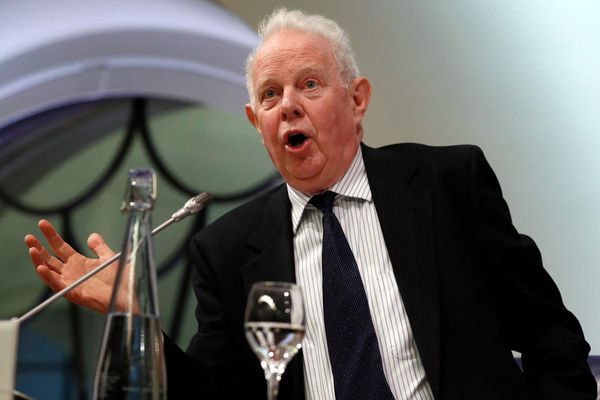WASHINGTON _ President Donald Trump's standing among Jewish voters may be deteriorating even further despite his efforts to court this critical demographic group, jeopardizing victory next year in the must-win state of Florida.
The president recently told reporters that American Jews, who voted overwhelmingly against Trump in 2016, are either "ignorant" of his policies on Israel or "disloyal" to the state by supporting Democrats.
Jews play a slightly outsized role in Florida, where they represent 4% of the voter population, compared to 2% nationally. The margin of victory in the last two presidential elections in Florida has been less than 1%. That makes even marginal shifts among Jewish voters significant, according to Republican and Democratic pollsters who have tracked hardening resistance to Trump among American Jews throughout his presidency.
"It's not a massive shift, but you see some pieces in the data suggesting it is possible that Trump is a particular phenomenon among Jewish voters that will push them even further to the Democrats," said Democratic pollster Jim Gerstein.
A private poll conducted during the 2016 election found that 68% of Jewish Floridians supported Hillary Clinton, just shy of the 71% of Jewish Americans who supported her nationwide. But polling in 2018 indicated that Jewish voters only increased their opposition to Trump's Republican Party: 79% of the community voted for Democrats in the midterms and 71% said they would not even consider voting for Trump in 2020.
Trump won Florida by less than 113,000 votes in 2016 without chipping away at Jewish support for Democrats: Clinton won the same percentage of the state's Jewish vote as Barack Obama did in 2012, according to exit poll data. But while Trump does not necessarily need to win over Jewish votes, strategists say that he cannot afford to lose any more of the constituency without risking the state itself.
A 10-point shift in Florida's Jewish vote _ amounting to roughly 60-80,000 ballots, depending on turnout _ could swing the race.
"To move the vote by 1% when you've got 4% of the population, you're talking about a 25% swing. That's not realistic," Gerstein said. "But the larger dynamic right now is that we do have data from the Trump presidency among Jews, and what we see is that, as hard as it is to move the Jewish vote to make it even more Democratic, we witnessed some movement in 2018 in that direction."
The Trump campaign is already collecting opposition material on the Israel policies of leading Democratic candidates, according to two campaign aides. Campaign officials believe they can make a positive case for Trump while attacking Democrats increasingly vocal in their opposition to Israeli government policies.
Aides are examining the Democratic candidates' relationships with AIPAC, compiling their public statements and tracking their voting records on issues such as the Boycott, Divestment and Sanctions (BDS) movement targeting Israel _ a campaign deeply unpopular among American Jews and supported by two of Trump's favorite Democratic foils, Reps. Ilhan Omar of Minnesota and Rashida Tlaib of Michigan.
"While anti-Semitism continues to plague the Democratic Party, President Trump is making good on his promise to defend Israel and stand with our allies," said Sarah Matthews, a spokeswoman for the Trump campaign.
But polls do not provide evidence that the policies Trump describes as pro-Israel _ such as relocating the U.S. Embassy in Israel from Tel Aviv to Jerusalem, recognizing Israeli sovereignty in the Golan Heights and withdrawing from the Iran nuclear agreement _ have increased his support among American Jews, who are critical of Israeli government policy themselves and consistently prioritize issues of pluralism, religious freedom, welfare and the economy in their voting patterns.
Nor do they provide credence to claims from Trump supporters that Jewish voters are turning to the Republican Party. "We find no evidence that this has changed significantly during the Trump administration so far," Frank Newport, the editor-in-chief of Gallup, stated in a report released on Tuesday.
"If Jews were to vote for a Republican in 2020, it would be a real departure from historical norms," said Whit Ayres, a veteran Republican pollster who worked for Marco Rubio's 2016 presidential campaign. "And there's every reason to think that turnout among Jewish voters will be exceedingly high _ a lot of the demographic categories of Jewish voters overlap with categories of voters very likely to turn out."
Ayres emphasized that movements among other voter groups, such as Hispanic and African American voters, may offset shifts within the Jewish community.
"The right question to ask is, how important is the Jewish vote in Florida statewide elections? And it's hard to argue that it's not given the closeness of Florida's races," he added.
Mark Mellman, a pollster who recently founded Democratic Majority for Israel, a group working to maintain Democratic support for the U.S. ally, said that Jewish backing for Democrats relies on the party maintaining a base-level standard of support for Israel's right to exist as a Jewish state.
"Every sign is that Trump is going to do very poorly and that Democrats are going to do very well, but that presupposes that circumstances don't change, and that they look at both parties and say both parties are pro-Israel," he said. "We know the field, and this is not going to happen _ but if Ilhan Omar became the nominee for the party, would the Jewish vote change? Yeah, probably."
To that end, Democratic success will rely heavily on the eventual nominee.
One private poll from June 2016 recently obtained by McClatchy spooked Jewish Democratic operatives into action after it revealed low favorability numbers for Clinton _ and even lower approval numbers for Bernie Sanders, her opponent in that year's primary race and a leading contender for the 2020 Democratic nomination. That poll initially showed her approval numbers in the mid-50s, accelerating a $1 million campaign targeting Jewish voters in South Florida to shore up support for the nominee.
It also found majority support among Florida Jews for Israeli Prime Minister Benjamin Netanyahu, prompting the campaigners to take a more moderate approach to advertising than they might have on a national level.
"Polling has consistently shown that Florida Jewish voters lean more centrist than the Jewish population nationally," said Aaron Keyak, a Democratic strategist with Bluelight Strategies who organized independent campaign efforts targeting Florida's Jewish vote for the last three presidential races.
"The swing Jewish voters in Florida are even more centrist," Keyak added, "which is important when we're targeting Jewish Floridians with persuasion messaging _ when we're trying to get people who were considering staying home to come out and vote Democrat, or more radically, to swing their vote."







